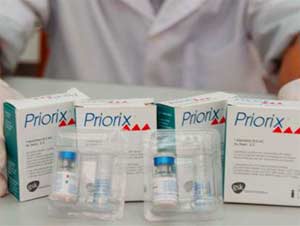Since the introduction of vaccines, millions of children around the world have been saved from infectious diseases each year. In Vietnam, thanks to the implementation of an expanded immunization policy, the child mortality rate has steadily decreased. Therefore, understanding vaccination will help us feel more at ease and less anxious about its potential complications.
What is Vaccination?
 |
Priorix Vaccine (Image: TTO) |
Vaccination is the process of creating artificial immunity in the body by introducing a vaccine containing antigens (depending on the disease, the antigens may be inactivated live viruses, attenuated viruses, synthetic antigens, or toxins) to stimulate the body to produce antibodies against pathogens.
Components of a Vaccine:
– Antigens: these can be bacteria, inactivated viruses, toxins, synthetic antigens, etc.
– Stabilizers: used to preserve the vaccine and prevent bacterial growth.
– Environment.
– Trace foreign antigens: present in very small amounts that pharmaceutical companies aim to eliminate; the less present in the vaccine, the better.
Nature of Antigens in Vaccines:
– Attenuated viruses: including vaccines for chickenpox, mumps, and rubella.
– Virulent viruses: including vaccines for measles and poliomyelitis.
– Inactivated viruses: poliomyelitis vaccine.
– Virulent bacteria: BCG vaccine for tuberculosis.
– Inactivated bacteria: whooping cough vaccine.
– Polysaccharides: vaccines for meningococcal disease, typhoid fever, and Haemophilus influenzae meningitis.
– Surface antigens: hepatitis B virus vaccine.
Possible Complications from Vaccination
Like all medications, vaccines can also cause unwanted side effects; however, the incidence of these effects is very low and depends on various factors such as the manufacturer, storage and distribution processes, injection techniques, syringes, and the individual’s constitution…
Systemic Reactions: anaphylaxis, fever…
Local Reactions:
– Injection site abscess due to infection.
– Cold abscess at the injection site due to vaccine precipitation (if not shaken before injection).
– Lymphadenitis from excessive BCG vaccination.
Additionally, depending on the type of vaccine, there may be different complications such as:
– Poliomyelitis vaccine may cause vaccine-derived poliomyelitis (incidence of 1 in 5 million to 1 in 8 million).
– The measles, mumps, and rubella vaccine may cause rash, mild fever, lymphadenopathy, and joint swelling (incidence of 1 in 2 to 1 in 5); encephalitis and seizures (very rare).
– The BCG vaccine for tuberculosis may cause suppurative lymphadenitis and subcutaneous abscess (incidence of 1 to 2%)…
Note:
– Do not administer the next vaccine dose if there is a reaction to that vaccine.
– Do not vaccinate if suffering from a severe or moderate illness (a doctor will examine the patient before vaccination).
Although there have been some recent cases of unexpected adverse events following the measles, mumps, and rubella vaccination (Priorix vaccine), for which authorities are currently investigating the causes, vaccines remain an effective weapon in the fight against disease, saving millions of children every year, and the expanded immunization program continues to demonstrate its superiority in primary disease prevention in our country.
Dr. NGUYEN DINH SANG
(References: Pediatrics Book – University of Medicine and Pharmacy in Ho Chi Minh City)




















































